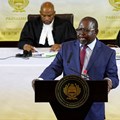In the face of a daunting combination of economic and fiscal imperatives Finance Minister Enoch Godongwana in his Budget Speech today gave a realistic assessment of the socio-economic and fiscal challenges confronting South Africa, including a ‘high sovereign credit risk.

Source: Supplied. Finance Minister, Enoch Godongwana
The Budget had to walk a complex tightrope of tough economic and political decisions within a limited fiscal space. The fiscal ‘mix’ in the Budget sought to find the difficult balance of reconciling what is needed to underpin the economy with continued commitment to fiscal consolidation and containing debt.
The 2024 Budget recognised the overall need to slow the growth of national debt and lower its cost with a number of measures intended to bridge the fiscal gap.
As broadly expected, the Budget embodied several financial buffers for the medium-term fiscal challenge ranging across the broad spectrum of spending decisions, debt management and certain tax adjustments to ‘balance the books’.
The Budget nonetheless rightly acknowledged that ‘the size of the pie is not growing fast enough to meet our developmental needs’ and that ‘there are risks to the domestic outlook’.
One major risk to the fiscal outlook is the continued dominance of interest-rate payments in the Budget. And what is also essential in the aftermath of further bailouts for major SOEs like Eskom and Transnet is that the continued assistance needs to be firmly linked to productivity and performance gains to avoid perpetuating a situation of quasi-permanent financial relief for ailing SOEs.
If South Africa is now to draw down from the GFECRA, the proceeds must be wisely and responsibly used. Inevitably, unless there are strong guardrails and safeguards to guarantee better control of a vulnerable fiscal situation, a number of negative consequences will emerge on both the external and internal fronts that would be very economically damaging to South Africa.
Prioritising inclusive growth
Economic growth in South Africa has also been too low for too long. A major threat to the fiscal balance has been the lack of adequate tax revenues as a result of persistent low growth.
The narrative around growth must therefore be strengthened and prioritised. As the Finance Minister has often emphasised, whatever the immediate fiscal steps ‘to balance the books’, everything ultimately points to the need for much higher inclusive growth to achieve fiscal sustainability and economic development in the longer term.
Global research has nevertheless shown that the number of countries that have successfully grown out of excessive public debt is actually quite small, whereas the number of countries that have experienced major fiscal difficulties, which caused higher inflation and other serious economic setbacks, is quite large.
Growth must be at the top of the hierarchy of policy goals. South Africa is well-placed to be successful here, provided a clear, confidence-building
economic strategy, coupled with promised growth-friendly structural reforms, emerges after the pending elections in May.
Balancing welfare and workforce
And if job-rich growth can help to get more citizens out of welfare and into work, the lower costs and risks of welfare dependency will also improve the fiscal metrics. In short, the choice remains between real economic growth with its advantages, or the yoke of low growth with its creeping socioeconomic costs and welfare dependency. This remains a key challenge for South Africa’s public finances.
It is, however, also increasingly clear from the latest Budget that everything cannot be placed on the shoulders of the National Treasury. Cohesive policy making and effective delivery require the government machine as a whole to play its part.
It is becoming even more evident that the efficacy of other key decision-makers – including the enhanced role for the private sector – has become indispensable for South Africa’s economic success. Fiscal policy alone cannot provide the solutions.
The Budget growth forecasts for the immediate future, nevertheless, fall far short of what the country needs. Unless South Africa wants to get trapped in this low growth range, bolder steps are needed to ‘grow the economic pie’.
What clearly comes through the fiscal gloom of recent Budgets is again the overwhelming need for a strong and sustainable boost in South Africa’s flagging growth rate on the basis of significant current reforms and their active implementation.






































